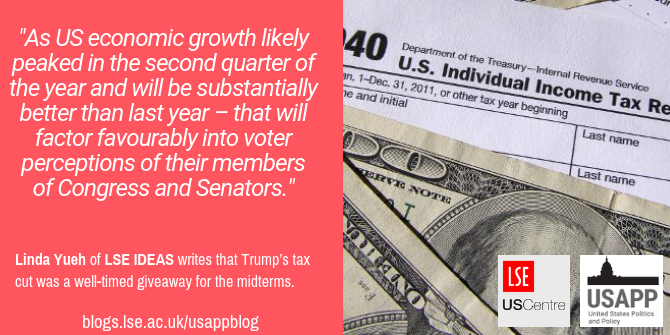 When we talk about elections, the role of the economy inevitably looms large. Less than a year ago, Congress passed a $1.5 trillion tax cut bill, which alongside increased spending, may stimulate economic growth until 2019. Linda Yueh writes that the Trump-sponsored tax cut and fiscal stimulus are likely to influence voters to a greater degree than the president’s trade war with China, especially if falling unemployment rates lead to higher wages.
When we talk about elections, the role of the economy inevitably looms large. Less than a year ago, Congress passed a $1.5 trillion tax cut bill, which alongside increased spending, may stimulate economic growth until 2019. Linda Yueh writes that the Trump-sponsored tax cut and fiscal stimulus are likely to influence voters to a greater degree than the president’s trade war with China, especially if falling unemployment rates lead to higher wages.
- This article is part of our ‘Making Sense of the Midterms’ series curated by Rob Ledger (Schiller University) and Peter Finn (Kingston University) and published in tandem with the LSE US Centre’s public event on that theme on 7 November 2018
‘It’s the economy, stupid’ was the phrase made famous by Bill Clinton’s 1992 presidential campaign when it zoomed in on the economic concerns of voters. Will the economy play such a role again in the 2018 midterm elections?
The $1.5 trillion tax cut package and the $1.3 trillion spending bill enacted by Congress in the first quarter of the year have boosted economic growth, which accelerated to 4.2 percent on an annualised basis in the second quarter. Estimates by the Congressional Budget Office and think tanks like the Conference Board see the effects of the fiscal stimulus keeping growth higher in the second half of this year before petering out in 2019. The boost will make people feel better off than last year when economic growth was 2.2 percent. Timing-wise, that means economic growth will likely remain above 3 percent during the midterm elections in November.
But, will the ongoing trade war with China disrupt the economy? It’s difficult to estimate the economic impact of the imposition of tariffs on Chinese imports. At present, around half of Chinese imports are subject to a higher tax of some 10 percent. This may rise to 25 percent, which was the originally mooted rate by the Trump administration. And if a trade deal is not reached with China, then the US has said that all Chinese imports totalling some half a trillion dollars will be subject to a tariff next year. That amounts to nearly 3 percent of world merchandise trade, which has raised alarm bells for the global economy.
For the US economy, although there will be an economic cost particularly for consumers who will likely have to pay higher prices for items ranging from consumer electronics to luggage, the estimated negative impact is at present less than the positive boost from the fiscal stimulus package. This is due to the relatively small share of trade in US GDP. Although America is the world’s second largest trading nation, trade (exports plus imports) accounts for less than 30 percent of GDP, so a tariff on imports from China is unlikely to do more than dampen economic growth.
Of course, elections are about targeting voters, so China’s retaliatory tariffs have focused on raising prices for American farmers and consumers in key Congressional districts as well as Trump supporters. Thus, the economic harm is more focused than the national figures would suggest. It’s one of the reasons why the Trump administration has put together a $12 billion bailout for farmers.

“Personal Income Taxes Ver3” by ccPixs.com is licensed under CC BY 2.0
But the economic impact stretches into investment decisions which are potentially costly. Since half of international trade is via global supply chains (the WTO estimates that half of trade are intermediate goods), tariffs can affect the investment decisions of multinational companies. Rather than choosing to locate, source and produce in the most efficient and cost-effective way, American and Chinese companies may start to reposition their production to avoid running afoul of political tensions. Investment decisions are harder to reverse than a tariff that can be removed tomorrow. Once the decisions have been made, funds are invested and people are relocated, so change is costly. Forcing companies into making less than efficient investment decisions will have an economic cost that is harder to estimate but will impact jobs and growth.
It’s not the only cost. By not granting approval, China scuppered a $44 billion M&A deal worked on for years by US tech company Qualcomm for Dutch chipmaker NXP. The wasted monies from such deals also add to the economic cost and could deter deals as well as private investment at a time when more investment is needed.
So, the overall economic impact of the US-China trade war is difficult to estimate. But, in the short-term, by the time of the midterm elections, trade tensions are unlikely to outweigh the positive impact from the fiscal stimulus.
Voters care not only about the economy generally, but specifically their own wages. With unemployment at record low levels, below 4 percent, and strong jobs growth each month, income is expected to pick up. After a decade where wage growth had lagged behind productivity growth or what a worker produces in an hour, better income growth will add to voters’ positive views of the economy.
The electorate of course votes on a number of dimensions, which fall outside of economics. But their own economic circumstances play a role. And as US economic growth likely peaked in the second quarter of the year and will be substantially better than last year – that will factor favourably into voter perceptions of their members of Congress and Senators.
By the time the economy slows next year due to the fading stimulus and potentially an escalated trade war with China, the elections will be over. If the budget deficit remains high due to the tax cuts, then it may have an eventual impact on the economy, but not by the November midterms. So, it’s a well-timed stimulus.
Please read our comments policy before commenting.
Note: This article gives the views of the author, and not the position of USAPP – American Politics and Policy, nor the London School of Economics.
Shortened URL for this post: http://bit.ly/2CE4RTn
About the author
 Linda Yueh – LSE IDEAS
Linda Yueh – LSE IDEAS
Linda Yueh (@lindayueh) is Visiting Senior Fellow, LSE IDEAS and member of the Policy Committee, Centre for Economic Performance. She is Fellow in Economics, St Edmund Hall, Oxford University and Adjunct Professor of Economics, London Business School. Her latest book is The Great Economists: How Their Ideas Can Help Us Today (US edition: What Would the Great Economists Do? How Twelve Brilliant Minds Would Solve Today’s Biggest Problems).






